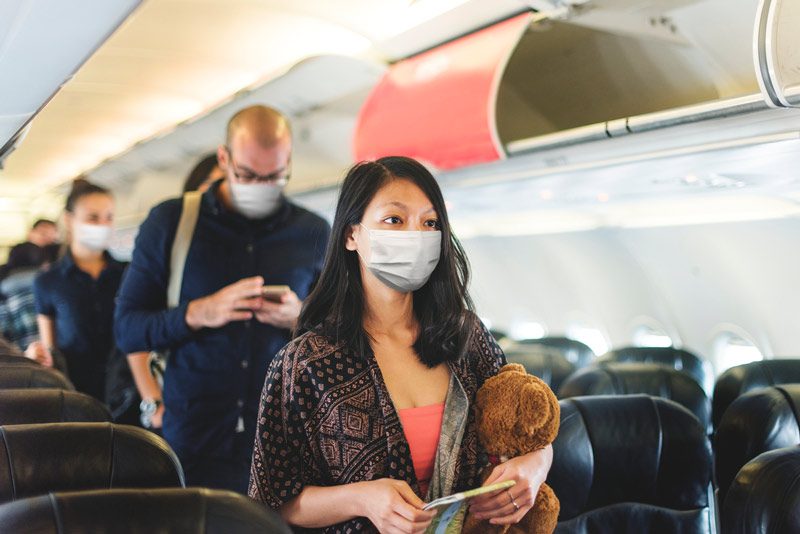You’ve been planning a vacation for a few months, but is now the right time to go? Taking a break could do you some good. A 2013 study found that traveling can enhance empathy, attention, energy, and focus, so you have more reason than ever to book a flight. But what if the mere thought of boarding a plane, train, or bus makes you anxious? After all, there’s a pandemic going on.
It turns out you’re not the only one nervous about traveling. Some 25% of Americans have travel anxiety — and that was before COVID-19. Imagine how many more people struggle with the same problem today.
Of course, it’s totally up to you whether you decide to go, but it is possible to have a good time if you do. As long as you know how to manage your mental health when traveling in 2022, you’re sure to have an amazing trip. Here are a few tips to help you enjoy the journey, not just the destination.
1. Take Precautions
If you’ve only recently begun to worry about traveling, you might be concerned about virus mutations and contracting or spreading illness during your journey. The best way to manage these anxieties is to take as many health and safety precautions as possible. Wear a mask, wash your hands often, and practice good personal hygiene. Taking the initiative will help you feel more in control and alleviate stress, even in unfamiliar settings.
2. Avoid Crowds
Another great way to minimize pandemic and travel-related stress is to avoid large crowds and heavily populated areas. Travel during a weekday or at night and go somewhere with few tourists during the winter months. Eat before you get to the airport and check-in online to save time and avoid long lines. These precautions can help you stay safe and avoid conversations with strangers, too, so you can manage travel and social anxiety simultaneously.
3. Stay Updated
Watching the news can help you stay informed about travel restrictions, COVID-19 variants, and vaccination requirements. However, too much media can also negatively affect your mental health. Manage your consumption by following straightforward news accounts and checking them once a day to stay up to date without inducing your stress response. This way, you can still enjoy your vacation and avoid trigger symptoms like trouble sleeping and general anxiety.
4. Keep in Touch
Nearly 40% of Americans report feeling serious loneliness in the past few months, and taking a vacation could make matters worse. After all, you’ll be away from friends and maybe even family if you plan to travel alone. That’s why it’s so important to reconnect with loved ones back home, regardless of how far you’re traveling or how long you’ll be gone. Send friends Snapchat updates, call your mom, or text a sibling to improve your mental health instantly.
5. Stick to a Routine
Managing mental health and travel during the pandemic isn’t easy. However, you can make things easier for yourself by sticking to a routine, even while you’re away on vacation. Wake up and go to bed at the same time every day. You should also avoid taking naps to overcome jetlag and quickly adjust to different time zones. Having some structure to your vacation days will also help you know what to expect, so you feel more comfortable in unfamiliar places.
6. Take Care of Yourself
Schedule self-care into that routine, too. How you feel physically directly affects your mental well-being, so it should take priority even on vacation. That’s not to say you should refuse the fish and chips or a decadent dessert. Instead, learn to treat yourself while eating healthy and honoring your body with movement the other 80% or 90% of the time. Have a cocktail but drink water, too. The more you care for your physical well-being, the better you’ll feel mentally, both at home and on vacation.
Don’t Forget to Relax
It’s tempting to plan a bunch of activities during your travels. After all, you don’t want to miss out on sightseeing, shopping, and fun photo opportunities. At the same time, you mustn’t get so busy that you forget to relax. Remember, you’re taking a break, so you have every right to sit around and be lazy. Lay on the beach, take a bath, reflect on the day, or do absolutely nothing at all.
Remember to schedule time for relaxation, so you don’t miss out on the mental health benefits of taking a vacation.
About the Author: Ginger Abbot is a lifestyle and learning writer who talks about mental health, career development, and personal growth. Read more of her work on Classrooms, where she serves as Editor and contributing writer.
Photo by Gabriella Clare Marino on Unsplash
The opinions and views expressed in any guest blog post do not necessarily reflect those of www.rtor.org or its sponsor, Laurel House, Inc. The author and www.rtor.org have no affiliations with any products or services mentioned in the article or linked to therein. Guest Authors may have affiliations to products mentioned or linked to in their author bios.
Recommended for You
- How a Health Cleanse Can Reset Your Body and Mind - April 16, 2025
- The Truth about Relapse in Addiction Recovery - April 14, 2025
- The Power of Peer Support in Mental Health Recovery - April 10, 2025





